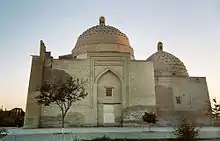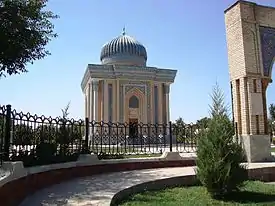Saif ed-Din al-Boharsi
Seid al-Hak va-d Din Abu-l-Maani Said ibn al Mutahar ibn Saif al-Boharsi (al-Bākharzī, Persian: باخرزی) (1190 - 1261), shortened as Saif ed-Din al-Boharsi, was a poet, sheikh, and theologian who lived in the 13th century. He was born in Khorasan region (northeastern Iran), and he got religious education in Herat and Nishapur cities. When he achieved unusual successes in mystical teaching, he moved to Khorezm. There he became one of nearest followers of very popular sheikh – Nadjm ed-Din Kubra. Afterwards, according to the prominent poet Abdurahman Djami Boharsi (15th century), Sheikh Saif ed-Din went to Bukhara as a tutor. In Bukhara he was honored with the title of "Sheikh al-Alam" ("sheikh of peace").

Unlike his teacher, Saif-ed-Din al-Boharsi safely survived the Mongol invasion. He lived in Bukhara about 40 years under new rulers. Moreover, he had incontestable authority over ruling elite. For example, Berke Khan, who was brother of Batu Khan, once had visited sheikh al-Boharsi. Because of this meeting, the powerful Khan of the Kipchak or Golden Horde had adopted Islam.
The mausoleum dedicated to him and Bayan-Quli Khan was built in the settlement called Fathabad, to the east from medieval Bukhara.[1]
